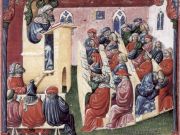Will the rise of online education, the student loan debt crisis, and the growing doubt about the value of college lead to a “higher education bubble”? Will we soon see a cultural defection in which many Americans choose alternatives to college? When more people realize they are paying too much for too little, will it change the way they view the path to success? Will the traditional higher education industry go the way of the housing market? The fall issue (vol. 24, no. 3) of our quarterly journal Academic Questions, now in print and online, asks, “Is there a bubble in higher education?”
NAS members have already received printed copies of this issue in the mail. If you are a member and would like to read journal articles online, email [email protected] with “AQ access” in the subject line. We’ll email you a unique link which you can use to set up your online AQ account. If you are not a member of NAS, please join us! We welcome everyone who agrees with our principles. Membership is renewable annually and includes a one-year subscription to Academic Questions in print and online.
Here are the featured articles from the “Higher Education Bubble” issue (there are also additional reviews, poetry, and “books, articles, and items of academic interest,” not listed here). Three of them (“Cost Versus Enrollment Bubbles,” “Scholasticism: Causes and Cures,” and “Academe’s House Divided”) are available free at www.nas.org.
Higher Education’s Precarious Hold on Consumer Confidence
Peter Wood, National Association of Scholars
Is there bubble in higher education? NAS president Peter Wood responds point-by-point to those who argue against the overwhelming signs that there is. In the process, Dr. Wood makes a convincing case that higher education badly needs an overhaul in order to operate more effectively and efficiently.
[A previous version of this article is available on NAS.org here.]
Cost Versus Enrollment Bubbles
Richard K. Vedder, The Independent Institute and
Andrew Gillen, Center for College Affordability and Productivity
In addressing the same question, Richard K. Vedder and Andrew Gillen systematically explain how we are currently facing two potential and interacting bubbles: costs and enrollments. As bubbles inflate, “it is easy to rationalize continuing trends and mock critics as doomsayers,” but the unconvinced should carefully consider why—based on the best estimate of yearly instructional costs for current students—Americans “are still spending $409 billion on higher education when it should cost around $150 billion.”
Success without College
Jason Fertig,
Scholasticism: Causes and Cures
Counseling and Social Justice
Robert C. Hunsaker,
On Hypertext, or Back to the Landau
David Solway
In another of his clever and learned ruminations, wordsmith David Solway unravels the truth about “hypertext,” and shows how those never-ending links to others works in online publication can actually fragment and disorient the student mind. Dr. Solway proves that that if a book is a fortifying font of knowledge, hypertext is a debilitating labyrinth.
Catholic in Name Only
Anne Hendershott, The King’s College
 A number of Catholic colleges and universities have become as secularized as many once identifiably Protestant institutions of higher education. Anne Hendershott describes some of the most egregious examples of this devolution, as well as various efforts to counteract it.
A number of Catholic colleges and universities have become as secularized as many once identifiably Protestant institutions of higher education. Anne Hendershott describes some of the most egregious examples of this devolution, as well as various efforts to counteract it.
Academe’s House Divided
Daniel B. Klein,













